Top 10 Teas for Calming, Sleep, and Anxiety

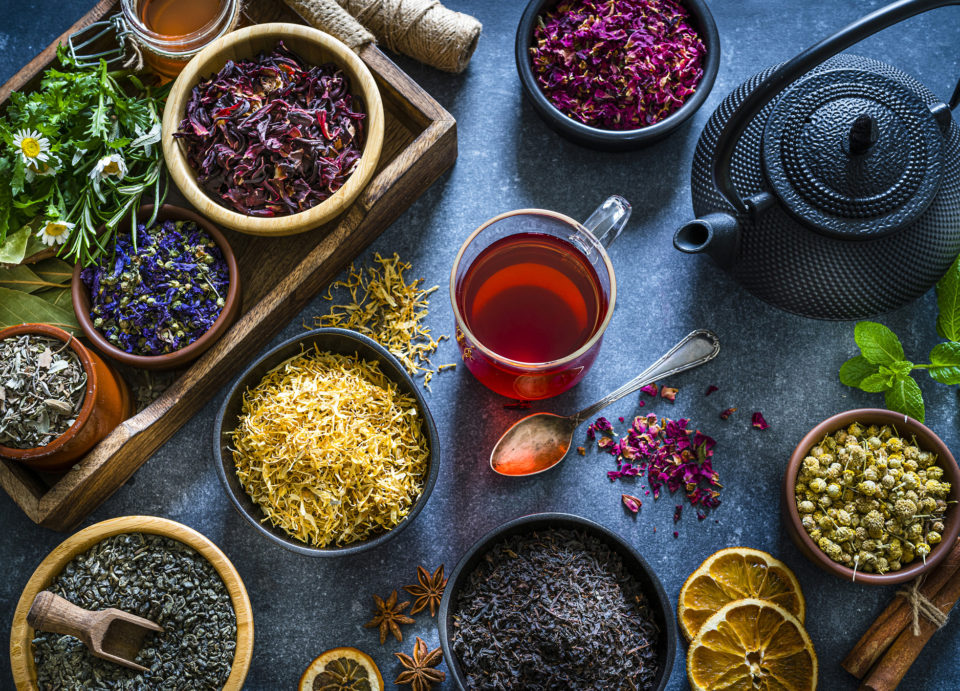
Going through a stressful time at work or home? Struggling to control your anxiety levels or having troubles falling or staying asleep at night? You could already have a natural remedy right in your kitchen that can make a huge difference: tea! While tea also has properties to calm inflammation, boost energy, or even support the immune system, it can also have a calming effect and help reduce anxiety. While there’s a baseline for self-care during stressful times; lean on your support system, seek professional help from a therapist or counselor, eat a balanced diet, hydrate, focus on sleep, and exercise, tea could help support the work you’re doing. This FoodTrients® list of top 10 teas and herbal blends that are best for relaxation and anxiety could really support you in getting through a stressful time.
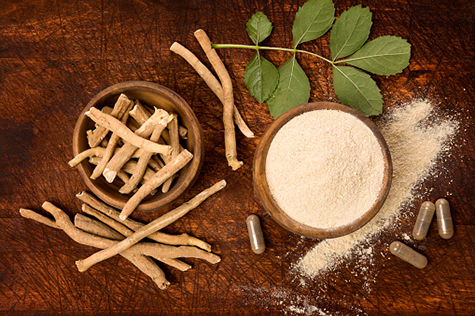 Ashwagandha
Ashwagandha
Ashwagandha is an herb from a small green shrub native to India. It’s classified as an “adaptogen,” which is a group of calming plants that help the body resist stressors in the physical, chemical, or mental arenas. Commonly used in traditional Ayurvedic medicine, Ashwagandha has been shown to reduce stress and anxiety. It also provides several other health benefits such as adrenal support, the ability to help lower blood sugar, reduce cortisol levels, and even boost brain function and focus. Ashwagandha tea is safe for most people but please consult with your doctor if you’re pregnant, breastfeeding, or have an autoimmune condition before you consider implementing adaptogens.
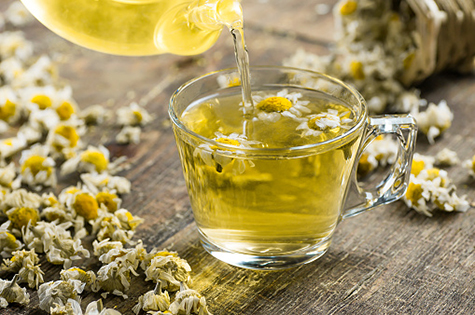 Chamomile
Chamomile
Chamomile tea is one of the most popular herbal teas used for sleep and relaxation. It acts as a mild sedative to help calm the nerves and reduce anxiety, as well as help reduce nightmares, insomnia and other sleep problems. The scent of chamomile may work by reducing Adrenocorticotropic hormone (ACTH) levels, causing a mild sedative effect. ACTH is the hormone that regulates cortisol – your body’s main stress hormone. The main caution for this tea is if you are pregnant, it should be avoided.
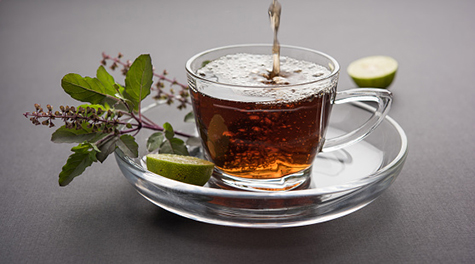 Holy Basil
Holy Basil
Otherwise known as Tulsi tea, holy basil is related to both Thai and European basil so often used in cooking. Holy Basil contains apoptogenic properties shown to reduce stress. It also may include antibiotic, blood sugar lowering, and antioxidant properties to support your health in many ways. There’s no caffeine in this tea so feel free to drink it throughout the day during school or work, or even use it as a calming agent before a test or presentation.
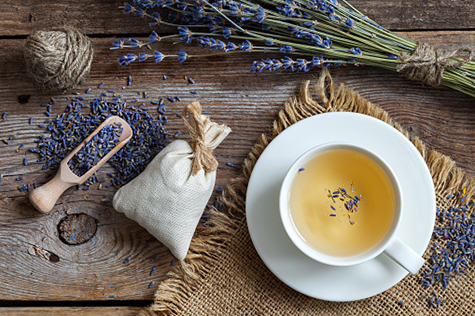 Lavender
Lavender
Widely known for relaxation and its soothing floral scent, lavender can calm the senses. Commonly used in massage and essential oils and baths, it also can be consumed as tea if you use a “food grade” variety. Lavender tea is made from the small purple buds of the flowering plant; the part that smells so lovely. Research has shown that drinking lavender tea and especially smelling its aroma before bed may help you relax, making it easier to fall asleep and feel more rested in the morning.
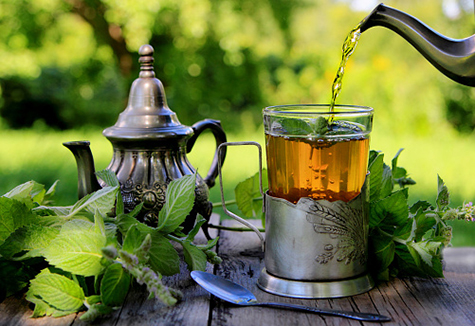 Lemon Balm
Lemon Balm
A member of the mint family with a bright citrus scent, lemon balm has been used for centuries to reduce stress and improve sleep. Research shows that it may act as a mild sedative and could help relieve insomnia-related symptoms that interrupt your sleep as well as lower feelings of stress, anxiety, and even depression. It may also help with indigestion, which is a major sleep disruptor, so if your stress or anxiety are causing an upset stomach, this could be a great choice for you.
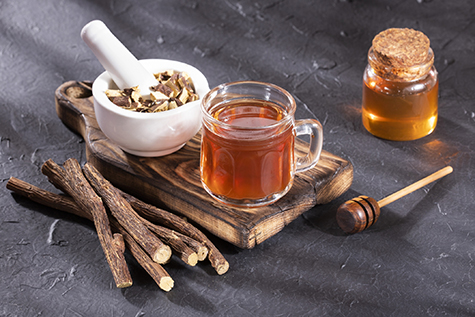 Licorice
Licorice
Frequently used in cold and flu teas or for a digestive as well as a natural sweetener and candy, licorice is also found in tea form. Animal studies suggest that licorice may reduce stress by supporting adrenal gland function, working like the other adaptogens on this list. Like lemon balm, licorice is also a popular herb to help manage inflammation in the intestinal tract and improve digestion so if you’re experiencing stomach or digestive issues due to high stress or anxiety levels, this could be another great option because it could help reduce painful spasms or bloating.
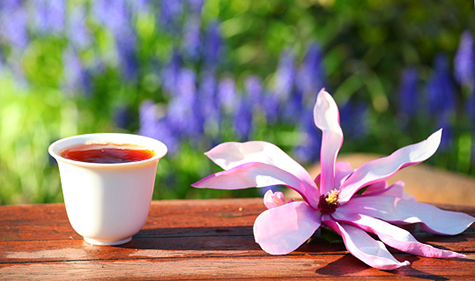 Magnolia bark
Magnolia bark
Magnolia tea is made mostly out of the bark of the flowering plant, while still including some of the dried buds and stems. It is widely recognized for its anti-anxiety and sedative effects but keep in mind that it has both bitter and pungent tastes so it may take some getting used to. The compound honokiol found in Magnolia has been shown to modify GABA receptors in your brain, which may increase sleepiness. Decreased time to fall asleep and increased length of sleep was seen in animal studies from using magnolia though further human studies are needed to confirm these effects in humans. You may most commonly encounter this tea if you use traditional Chinese medicine.
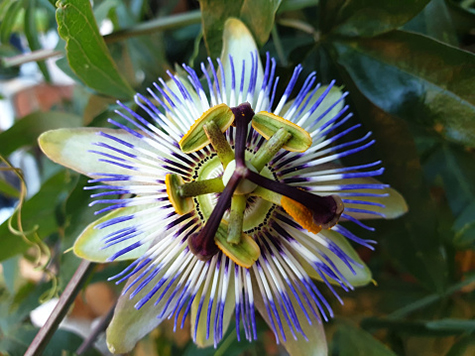 Passionflower
Passionflower
There’s a reason you’ll so often find passionflower used in sleep supplements and herbal blends; dried leaves from the Passiflora vine are used for calming, even hypnotic, passionflower tea. It’s been used in traditional medicine specifically for reducing anxiety and improving sleep. In a 2011 double-blind placebo-controlled study, 40 participants reported better sleep quality after drinking a cup of passionflower tea for 1 week compared to the placebo. Drinking this tea may ease overall anxiety, without the side effects of prescribed sedatives or antianxiety medications. Enjoy a cup of passionflower tea before bed if you’re looking to improve your sleep quality.
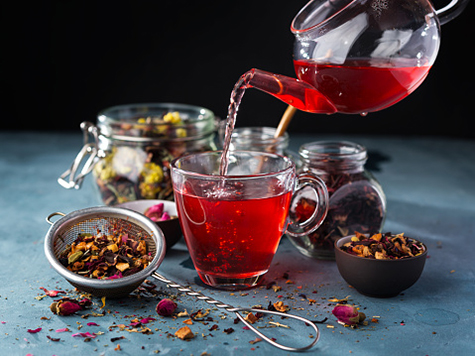 Rose
Rose
Not to be confused with rose-hip tea, rose tea is made with the petals of the rose plant. Rose hips are the fruit of the plant, are high in vitamin C, and can support the immune system and aid digestion. Rose petal tea, on the other hand, is calming both from the floral scent and perhaps also from the antioxidants it contains. Rose tea has been studied in women for both alleviating menstrual pain and improving psychological well-being. Though studies are limited, rose tea may be able to deliver stress-reducing and sleep-inducing effects. If you choose rose tea, make sure to inhale some of the fragrant vapors while taking a sip; studies have shown that the rose scent reduces anxiety, pain, distress, and even blood pressure.
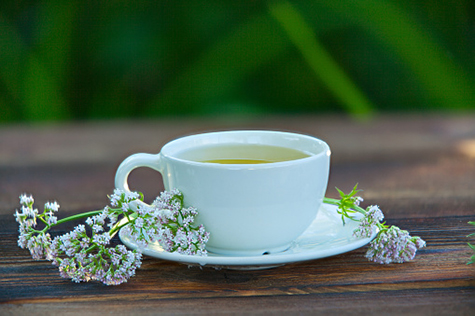 Valerian
Valerian
Valerian is one of the most popular herbal sleep aids used in Europe and the United States today. Valerian tea is made from the roots of the herb that have been dried. Studies have shown that it may decrease the time it takes to fall asleep and improve sleep quality overall. Another benefit of using valerian as a sleep aid is that it likely won’t interfere with your REM sleep cycle, meaning you won’t wake up feeling groggy. Make a cup of valerian tea before bed if you’ve got a long day ahead or want to catch up on some uninterrupted sleep.
Try drinking some of these herbal teas the next time you need to relax and unwind. Make sure to work with your doctor or dietitian to see if herbal remedies could be safe and effective to add to your nightly routine based on your unique needs, health conditions and medications.
Have you used any teas to help support anxiety and relaxation?
Let us know about your experience in the comments!
References
Forster HB, Niklas H, Lutz S. Antispasmodic effects of some medicinal plants. Planta Med. 1980;40:309–319.
Srivastava JK, Shankar E, Gupta S. Chamomile: A herbal medicine of the past with bright future. Mol Med Rep. 2010;3(6):895–901. doi:10.3892/mmr.2010.377
Goel N, Kim H, Lao RP. An olfactory stimulus modifies nighttime sleep in young men and women. Chronobiology international. 2005 Jan 1;22(5):889-904.
Barati F, Nasiri A, Akbari N, Sharifzadeh G. The Effect of Aromatherapy on Anxiety in Patients. Nephrourol Mon. 2016;8(5):e38347. Published 2016 Jul 31. doi:10.5812/numonthly.38347
Tseng YF, Chen CH, Yang YH. Rose tea for relief of primary dysmenorrhea in adolescents: a randomized controlled trial in Taiwan. Journal of midwifery & women’s health. 2005 Sep 10;50(5):e51-7.